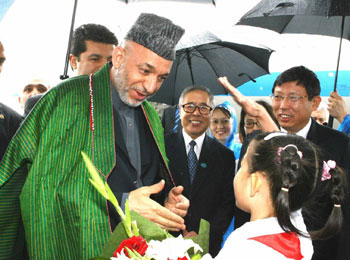Founded on the tenet of defending regional peace and stability, the Shanghai
Cooperation Organization (SCO) has embarked on a long-term campaign against the
"three evil forces" and is poised to continue efforts to promote security
cooperation.

Afghan President Hamid Karzai, left front, is
greeted by a Chinese girl upon his arrival at the Pudong International
Airport in Shanghai, east China on June 14, 2006. Karzai is here to attend
the summit of the Shanghai Cooperation Organization as guest of the host
country. [Xinhua] |
At the Thursday summit which marks the fifth anniversary of theSCO's
establishment, presidents of the six SCO member states are expected to sign
important documents on the promotion of the partnership in security, said SCO
Secretary-General Zhang Deguang at a news conference in Beijing ahead of the
summit.
In April, the defense ministers of the SCO countries announced plans for an
anti-terrorist exercise in Russia next year, which would be the largest-ever
joint military exercise compared with the previous three.
The regional group, which consists of China, Kazakhstan, Kyrgyzstan, Russia,
Tajikistan and Uzbekistan, originated and grew from the Shanghai Five mechanism,
which was founded in 1996 by China, Russia, Kazakhstan, Kyrgyzstan and
Tajikistan with the aim of strengthening confidence-building, carrying out cuts
in armed forces in their border areas and promoting regional cooperation.
On the day when the SCO was founded, the six heads of state signed the
Shanghai Pact on fighting terrorism, separatism and extremism. The SCO is one of
the earliest international organizations that hold the anti-terror banner.
A regional anti-terror agency was launched in Tashkent, capital of
Uzbekistan, during the 2004 SCO summit to coordinate SCO members' efforts in
fighting the "three evil forces" -- terrorism, separatism and extremism.
In line with the agreement on strengthening mutual trust, China has, through
equal consultation, settled historical disputes with Russia and its central
Asian neighbors along the common borders stretching at least 7,000 km.
In recent years, the SCO has done a lot of substantial work in defense and
security area.
Within the SCO framework, China and Russia held their first joint military
exercises, code-named "Peace Mission 2005" last August.
The one-week maneuvers, which involved 10,000 troops from the two countries,
started in Vladivostok in Russia's Far East and later moved to China's Shandong
Peninsula.
In addition to enhancing trust and friendship between the two countries, the
drills also demonstrated the determination and confidence of both armies to
counter new challenges and threats in the new situations.
Russian Defense Minister Sergei Ivanov has said SCO military exercises are
"very necessary" in view of the fact that international terrorist activities are
on the rise and terrorist are equipped with more modern types of weapons.
Meanwhile, the SCO members are trying to boost cooperation in information
exchange and judicial assistance.
Battling the "three evil forces" on the one hand, the SCO also has to focus
on cracking down on drug trafficking as well as related crimes such as money
laundering and weapons smuggling on the other.
Since Afghanistan shares common borders with a few Central Asian countries,
the region has become a crucial transit route for drug smugglers traveling from
Afghanistan to Europe and other parts of the world.
To tackle the issue of common concern, the SCO set up a liaison group in
November 2005 between the SCO and Afghanistan and promised to actively take part
in establishing an "anti-drug zoneˇ± around Afghanistan and in its economic
reconstruction.
As a guest of the host country, Afghan President Hamid Karzai will attend the
Shanghai summit on Thursday.
Though the SCO is trying to flex its muscles in the security field, Chinese
Foreign Minister Li Zhaoxing has stressed that the SCO "does not target any
third party."
"The SCO organization will not turn into a new military-political alliance,"
said Russian Defense Minister Ivanov during his latest trip to Beijing, where he
attended an SCO meeting on par with his SCO counterparts.